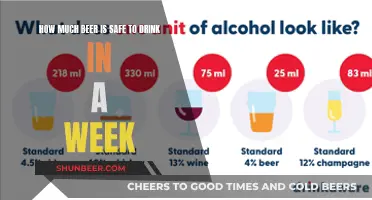
Ozempic is a prescription drug used to control high blood sugar in people with Type 2 diabetes. It is also used off-label for weight loss. While there is no direct interaction between alcohol and Ozempic, there are several reasons why drinking alcohol while taking Ozempic may not be advisable. This article will explore the effects of combining alcohol and Ozempic, the potential side effects, and how to minimise risks if you choose to drink while taking Ozempic.
| Characteristics | Values |
|---|---|
| Can you drink alcohol with Ozempic? | Yes, but it is not recommended. |
| Is there a direct interaction between Ozempic and alcohol? | No. |
| Does Ozempic affect the desire to drink alcohol? | Yes, it may lessen the reward from drinking alcohol. |
| Does alcohol affect blood sugar levels? | Yes, it can cause them to rise and then drop. |
| Does alcohol increase the risk of hypoglycaemia with Ozempic? | Yes. |
| Does alcohol worsen common Ozempic side effects? | Yes, it can cause nausea, vomiting, and stomach upset. |
| Does alcohol increase the risk of pancreatitis and kidney damage with Ozempic? | Yes. |
| Does alcohol interfere with weight loss benefits of Ozempic? | Yes, it can cause weight gain and affect metabolism. |
What You'll Learn

Ozempic and alcohol do not have a direct interaction
Alcohol's Effect on Blood Sugar
Alcohol can affect blood sugar levels and increase the risk of hypoglycemia when taking Ozempic. Alcohol can block the production and release of sugar from the liver, causing blood sugar levels to drop too low. This risk is especially high for people who are also taking insulin.
Increased Risk of Side Effects
Ozempic can cause nausea, vomiting, and an upset stomach, which may be worse if combined with alcohol. Alcohol can irritate the stomach lining and slow down how fast the stomach empties, resulting in nausea, vomiting, and stomach upset.
Weight Gain
Alcohol can also affect weight loss efforts. It can stimulate your appetite, lower your inhibitions, and cause weight gain. Alcoholic beverages are calorie-dense, and drinking can lead to poor food choices, especially if consumed on an empty stomach.
Health Risks
Regular alcohol consumption can lead to high blood pressure, stroke, and liver, heart, and kidney diseases. These are also common complications of diabetes.
Loss of Desire to Drink Alcohol
Some people taking Ozempic report losing their taste for alcohol altogether. It is thought that this involves how Ozempic works in the brain. Ozempic targets areas of the brain involved in regulating metabolism and appetite. These targets may block or lessen the dopamine boost that is activated when drinking alcohol.
Beer and Pantoprazole: Safe Mix or Health Risk?
You may want to see also

Alcohol may worsen common Ozempic side effects
Firstly, alcohol may worsen common Ozempic side effects, such as nausea, vomiting, and stomach upset. Alcohol can irritate the stomach lining and slow down stomach emptying, exacerbating these side effects. Ozempic's digestion-related side effects are usually worse when treatment is initiated or after dosage increases but tend to improve over time.
Secondly, alcohol consumption can negatively affect blood glucose levels, increasing the risk of hypoglycemia, especially in people also taking insulin. Hypoglycemia is a dangerous condition characterised by low blood sugar levels, with symptoms including anxiety, behaviour changes, blurred vision, cold sweats, confusion, weakness, and nausea. Alcohol interferes with the liver's ability to release sugar, and when combined with Ozempic, can cause blood sugar levels to drop too low.
Thirdly, both alcohol and Ozempic have been associated with an increased risk of pancreatitis and kidney damage. Pancreatitis, or inflammation of the pancreas, is a rare but serious side effect of Ozempic. Chronic, excessive alcohol use is also a known risk factor for pancreatitis. While the combined effect of alcohol and Ozempic on pancreatitis risk has not been specifically studied, it is advisable to moderate alcohol intake to minimise this risk.
Lastly, alcohol may interfere with the potential weight loss benefits of Ozempic. Alcoholic beverages are calorie-dense, and drinking can stimulate appetite and lower inhibitions, leading to poor food choices. Additionally, alcohol metabolism takes priority over fat and carbohydrate metabolism, further hindering weight loss efforts.
In conclusion, while there may be no direct interaction between Ozempic and alcohol, alcohol can worsen common side effects, negatively affect blood glucose levels, increase the risk of pancreatitis and kidney damage, and hinder weight loss efforts. It is important to discuss alcohol consumption with a healthcare provider when taking Ozempic to ensure a safe and effective treatment plan.
Beer and Stool Softeners: Safe Mix or Health Risk?
You may want to see also

Ozempic may reduce your desire to drink alcohol
Ozempic is a prescription drug used to control high blood sugar in people with Type 2 diabetes. It is also prescribed off-label to aid weight loss. Ozempic is administered as a once-weekly injection and works by mimicking a gut hormone called glucagon-like peptide-1 (GLP-1).
While there is no direct interaction between alcohol and Ozempic, the two substances can have a combined effect on the body. Alcohol can affect blood sugar levels, which may be particularly dangerous for people with Type 2 diabetes. Additionally, alcohol is known to worsen the side effects of Ozempic, such as nausea, vomiting, and digestive issues.
Ozempic's Effects on the Brain
Ozempic works by targeting areas of the brain involved in regulating metabolism and appetite. When you drink alcohol, a chemical called dopamine is released, activating your brain's reward system and making you feel good. However, the GLP-1 targets in the reward-related areas of the brain may block or lessen this dopamine boost, reducing the pleasurable effects of alcohol.
Reduced Alcohol Use
Animal studies have shown that medications similar to Ozempic may reduce alcohol use, as well as the use of other substances like cocaine, nicotine, and amphetamines. Due to these findings, researchers are currently investigating Ozempic as a potential treatment for alcohol use disorder.
Weight Loss Goals
If you are taking Ozempic for weight loss, alcohol consumption may hinder your progress. Alcoholic beverages are often calorie-dense, and drinking can stimulate your appetite and lower your inhibitions, leading to poor food choices. Additionally, alcohol metabolism takes priority over fat and carbohydrate metabolism in the body, further impacting weight loss efforts.
Health Risks
Regular alcohol consumption is associated with various health risks, including high blood pressure, stroke, and liver, heart, and kidney diseases. These conditions are also common complications of diabetes. Therefore, if you are taking Ozempic for diabetes management, it is essential to consider the potential health risks associated with alcohol consumption.
Side Effects
The side effects of Ozempic, such as nausea, vomiting, and digestive issues, can be unpleasant and may be worsened by alcohol consumption. Alcohol irritates the stomach lining and slows down stomach emptying, exacerbating the gastrointestinal side effects of Ozempic.
While there is no direct interaction between Ozempic and alcohol, it is important to understand the potential risks and side effects of combining the two. It is always advisable to consult with your healthcare provider to determine what is considered a safe amount of alcohol consumption for you while taking Ozempic.
Beer and Worker Stamina: Is There a Link?
You may want to see also

Alcohol may cause weight gain and affect weight loss efforts
The relationship between alcohol consumption and weight gain is complex and influenced by various factors, including drinking patterns (frequency, intensity, and type of alcohol consumed), individual behaviours, dietary habits, physical activity levels, sleep duration, genetics, and overall health status. While light-to-moderate alcohol consumption has not been consistently linked to weight gain, heavy drinking and binge drinking have been more strongly associated with weight gain and obesity. Therefore, it is important to monitor alcohol consumption as part of a balanced diet and healthy lifestyle, especially for individuals trying to manage their weight.
Additionally, alcohol can have negative effects on overall health, including an increased risk of high blood pressure, high triglycerides, insulin resistance, heart disease, stroke, liver disease, and certain types of cancer. These health risks are particularly relevant for individuals with diabetes, who need to be cautious about alcohol consumption due to its impact on blood sugar levels and the potential for alcohol to interact with diabetes medications.
Beer and Metformin: What You Need to Know
You may want to see also

Alcohol and Ozempic can both lower blood sugar levels
Ozempic is a medication used to treat Type 2 diabetes and is administered via a once-weekly injection. It is a brand name prescription drug that contains the active ingredient semaglutide. It is a glucagon-like peptide-1 (GLP-1) receptor agonist that works by increasing insulin production in the body, reducing appetite, and slowing digestion.
Alcohol, on the other hand, is known to affect blood sugar levels as well. When alcohol is consumed, the liver is unable to produce glucose, which can lead to low blood sugar levels. Additionally, alcohol can interfere with how the liver helps to keep blood glucose levels in balance. This means that drinking alcohol while taking Ozempic can increase the risk of hypoglycemia, or low blood sugar.
The effects of alcohol on blood sugar
Alcohol does not contain sugar itself, but most alcoholic beverages do contain sugar that can cause an increase in blood sugar levels. However, alcohol also contains "empty calories" that the body has to process, which can cause a rise in blood sugar levels as the body prioritises the metabolism of alcohol over fats and carbohydrates.
Despite this initial spike, alcohol typically leads to a drop in blood sugar levels. This is because alcohol changes how the pancreas functions, leading to an increase in insulin while inhibiting the liver's ability to release sugar. This combination of effects results in an overall drop in blood sugar levels.
The combined effects of Ozempic and alcohol
When Ozempic is taken with alcohol, there is a compounded risk of hypoglycemia. This is especially true for those who are also taking insulin or sulfonylureas. Hypoglycemia can cause a range of symptoms, including anxiety, behaviour changes similar to drunkenness, blurred vision, cold sweats, confusion, weakness, and nausea. In severe cases, it can lead to seizures, coma, and even death.
Therefore, it is important for those taking Ozempic to monitor their blood sugar levels before, during, and after drinking alcohol. It is also recommended to avoid drinking on an empty stomach, stay hydrated, and consume food along with alcoholic beverages.
Other considerations
In addition to the risk of low blood sugar, there are other potential side effects and health risks associated with drinking alcohol while taking Ozempic. Alcohol can worsen the side effects of Ozempic, such as nausea, vomiting, diarrhoea, and decreased appetite. Regular alcohol consumption can also lead to long-term health issues such as high blood pressure, stroke, and liver, heart, and kidney diseases, which are already common complications of diabetes.
Furthermore, alcohol can affect weight loss efforts for those taking Ozempic. Alcoholic beverages are calorie-dense, and drinking can stimulate appetite and lower inhibitions, leading to poor food choices. Alcohol can also slow down metabolism and interfere with the weight-related benefits of Ozempic.
Recommendations
For those taking Ozempic, it is generally recommended to stick to moderate alcohol consumption and always consult with a healthcare provider to determine what is considered a safe amount for the individual. It is also important to be mindful of blood sugar levels and to avoid drinking on an empty stomach.
Heart Condition and Beer: Is It Safe to Drink?
You may want to see also
Frequently asked questions
There is no known direct interaction between Ozempic and alcohol, but that doesn't mean it's safe for everyone. Alcohol can negatively affect your blood glucose levels and cause low blood sugar (hypoglycemia), especially if you have type 2 diabetes or are also taking insulin. It can also worsen Ozempic's side effects such as nausea and digestive issues.
If your diabetes is well-controlled, it's generally considered safe to drink in moderation, which means up to two drinks per day for men and one drink per day for women. However, if your diabetes is not well-controlled or you have other medical conditions, you may need to avoid alcohol entirely. Always consult your healthcare provider to determine what's considered a safe amount for you.
No, it is not recommended to drink alcohol on an empty stomach when taking Ozempic. Drinking on an empty stomach increases the risk of hypoglycemia. It's important to monitor your blood sugar levels closely before, during, and after drinking alcohol.
If you're concerned about the effects of alcohol on your blood sugar levels, you can try light beers or wines, which have less impact on blood sugar than sugary cocktails or high-alcohol-content drinks. Alternating alcoholic drinks with water can also help you stay hydrated and reduce the risks of side effects.







